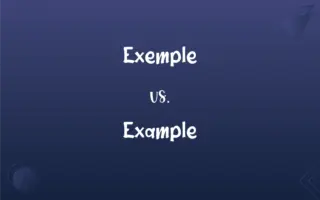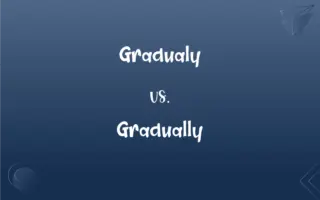Consicence vs. Conscience: Mastering the Correct Spelling
Edited by Aimie Carlson || By Janet White || Published on March 27, 2024
"Consicence" is an incorrect spelling; the correct spelling is "conscience" refers to an individual's moral sense of right and wrong.

Which is correct: Consicence or Conscience
How to spell Conscience?

Consicence is Incorrect

Conscience is Correct
ADVERTISEMENT
Key Differences
Recall "con" as in "convict" and "science" as in knowledge—your conscience convicts you with moral knowledge.
Imagine your "conscience" as your inner "science" or knowledge of what's right.
Link "conscience" with "science"; both have "science," but only one guides moral decisions.
Break it down: "con" (with) + "science" (knowledge) = conscience, not "consicence."
Use a mnemonic: "Can Our New Science Increase Everyone's Natural Conscientious Emotions?" focusing on the "science" in "conscience."
ADVERTISEMENT
Correct usage of Conscience
Her consicence wouldn't allow her to cheat on the test.
Her conscience wouldn't allow her to cheat on the test.
They tried to ignore their consicences and went ahead with the plan.
They tried to ignore their consciences and went ahead with the plan.
The decision weighed heavily on her consicence.
The decision weighed heavily on her conscience.
He struggled with his consicence after telling the lie.
He struggled with his conscience after telling the lie.
His consicence was clear because he knew he had done nothing wrong.
His conscience was clear because he knew he had done nothing wrong.
Conscience Definitions
Conscience is an individual's internal sense of right and wrong.
Her conscience wouldn't allow her to cheat.
Conscience acts as an inner guide to moral decision-making.
He followed his conscience during the dilemma.
Conscience serves as an ethical compass guiding behaviors.
They relied on their conscience to navigate ethical challenges.
Conscience is self-awareness that evaluates one's actions against moral standards.
Their conscience was clear after making a tough decision.
Conscience is the part of the human psyche that encourages ethical conduct.
His conscience was troubled by his actions.
An awareness of morality in regard to one's behavior; a sense of right and wrong that urges one to act morally
Let your conscience be your guide.
A source of moral or ethical judgment or pronouncement
A document that serves as the nation's conscience.
Conscience Sentences
A clear conscience helps you sleep better at night.
Listening to one's conscience is important for making ethical decisions.
Her conscience told her to admit the mistake and apologize.
He acted according to his conscience, even when it was difficult.
She struggled to silence her conscience after the dishonest act.
He had a guilty conscience after breaking his promise.
The voice of conscience can be a powerful guide in life.
The story explores the theme of conscience versus desire.
Having a guilty conscience can lead to anxiety and stress.
A leader with a strong conscience is respected and trusted.
A person with a good conscience strives to do what is right.
His conscience pricked him whenever he remembered the incident.
He sought advice from a friend when his conscience was in doubt.
She consulted her conscience before making the tough decision.
A troubled conscience often leads one to seek redemption.
The community praised her for acting with a clear conscience.
Her conscience guided her to return the lost wallet.
The debate centered around the role of conscience in law.
Children are taught to follow their conscience from a young age.
The novel's protagonist is tormented by his conscience.
Acts of kindness are often guided by a compassionate conscience.
A clean conscience is more valuable than wealth.
They launched a campaign to awaken the public's conscience on environmental issues.
Living with a guilty conscience can be a heavy burden.
A person's conscience shapes their moral compass.
Conscience Idioms & Phrases
Clear conscience
This means to be free of guilt or remorse.
He returned the lost wallet to its owner and felt a clear conscience.
Guilty conscience
This is the feeling of guilt and remorse for something one considers to be wrong.
She couldn't enjoy the stolen money because of her guilty conscience.
Prick of conscience
This is a feeling of guilt or regret for one's actions.
Every time he lied, he felt a prick of conscience.
Voice of conscience
This refers to the inner sense of what is right or wrong in one's conduct or motives, urging one to act morally.
The voice of conscience kept reminding him that honesty is the best policy.
Conscience-stricken
This describes someone who is deeply affected by guilt.
After realizing the pain he caused, he was conscience-stricken and sought forgiveness.
Matter of conscience
This phrase refers to a decision or action that is guided by one's personal sense of morality.
Donating to the charity was a matter of conscience for him, knowing how much they needed the support.
Conscience vote
This is a vote in which legislators are allowed to vote according to their personal conscience rather than according to an official line or policy.
The bill was subject to a conscience vote, allowing lawmakers to express their personal beliefs.
Against one's conscience
This means doing something that conflicts with one's sense of right and wrong.
She couldn't support the decision because it was against her conscience.
To have something on one's conscience
This means to feel guilty about something.
He had the accident on his conscience and couldn't forgive himself.
Conscience clause
This is a provision in a statute that permits individuals to act according to their conscience, especially in ethical matters.
The legislation included a conscience clause, allowing doctors to opt out of procedures they objected to on moral grounds.
FAQs
What is the pronunciation of conscience?
Conscience is pronounced as /ˈkɒnʃəns/.
What is the root word of conscience?
The root word is "conscientia" from Latin, meaning knowledge within oneself or moral awareness.
Which vowel is used before conscience?
The vowel "e" is used before the "n" in "conscience."
What is the verb form of conscience?
Conscience does not have a verb form; it is solely a noun.
Why is it called conscience?
It comes from the Latin "conscientia," meaning "with knowledge," referring to moral awareness.
What is the plural form of conscience?
The plural form is "consciences."
Which article is used with conscience?
The indefinite article "a" or the definite article "the" can be used with "conscience."
Is conscience an abstract noun?
Yes, conscience is an abstract noun.
What is the singular form of conscience?
The singular form is "conscience."
Which preposition is used with conscience?
The preposition "of" is commonly used with conscience, as in "a matter of conscience."
Is conscience a vowel or consonant?
The word "conscience" starts with a consonant.
How is conscience used in a sentence?
"Listening to his conscience, he decided to return the lost wallet."
Which conjunction is used with conscience?
The conjunction "and" is used to connect conscience with other concepts.
How do we divide conscience into syllables?
Conscience is divided into syllables as con-sci-ence.
What is a stressed syllable in conscience?
The stressed syllable in "conscience" is the first, "con."
Which determiner is used with conscience?
Determiners like "the," "your," or "an" can be used with conscience.
What is the first form of conscience?
Conscience is a noun and does not have verb forms; it remains "conscience."
Is conscience a countable noun?
Yes, conscience is a countable noun.
Is the word conscience imperative?
No, conscience is not used in an imperative form; it's a noun.
What is the opposite of conscience?
The opposite of conscience could be considered "immorality" or "unscrupulousness."
What is the third form of conscience?
As a noun, conscience does not have a third form.
Is conscience a noun or adjective?
Conscience is a noun.
Is the conscience term a metaphor?
Conscience can be used metaphorically to represent moral or ethical judgment.
How many syllables are in conscience?
There are three syllables in "conscience."
What is another term for conscience?
Another term for conscience is "moral compass."
Is conscience an adverb?
No, conscience is not an adverb.
Is conscience a negative or positive word?
Conscience is neutral; it can have positive or negative connotations depending on context.
Is conscience a collective noun?
No, conscience is not a collective noun.
What part of speech is conscience?
Conscience is a noun.
What is the second form of conscience?
As a noun, conscience does not have a second form.
About Author
Written by
Janet WhiteJanet White has been an esteemed writer and blogger for Difference Wiki. Holding a Master's degree in Science and Medical Journalism from the prestigious Boston University, she has consistently demonstrated her expertise and passion for her field. When she's not immersed in her work, Janet relishes her time exercising, delving into a good book, and cherishing moments with friends and family.
Edited by
Aimie CarlsonAimie Carlson, holding a master's degree in English literature, is a fervent English language enthusiast. She lends her writing talents to Difference Wiki, a prominent website that specializes in comparisons, offering readers insightful analyses that both captivate and inform.


































































